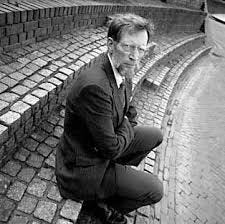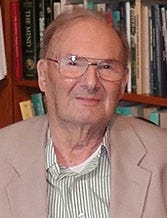In his Warranted Christian Belief (Oxford UP, 2000), Alvin Plantinga mounts a critique of John Hick's Kantianism in the philosophy of religion. In this entry I will begin an evaluation of Plantinga's critique. I will focus on just two and a half pages, pp. 43-45, and examine only one preliminary argument.
The question, very simply, is whether our concepts apply to the ultimately real. If God is the ultimately real, as he is if he is real at all, then the question is whether or not our concepts apply to God. If they don't, then we cannot refer to or think about God or make true and literal predications of him such as 'God is infinite.' If so, we cannot have any beliefs about God. Now Plantinga's project is to show that Christian belief (which of course includes beliefs about God) is warranted. But a belief about X cannot be warranted unless there is that belief. So there had better be beliefs about God, in which case there had better be true and literal predications about God. (Bear in mind that analogical predications about God and his attributes are intended by those who make them to be literal, not metaphorical.) That there are literal predications implies that God must have properties and that some of these properties must be such that we can conceive them, i.e., have concepts of them. In brief, it must be possible for some of our concepts to apply to God.
For Hick, God is the ultimately real, or simply 'the Real' but our concepts do not apply to God/the Real. (43) For present purposes, we needn't consider why Hick holds this except to say that it is for broadly Kantian reasons. And we needn't consider all the nuances of Hick's position. At present I am concerned only with Plantinga's attempted refutation of the bald thesis that none of our concepts apply to God. Plantinga writes,
If Hick really means that none of our terms applies literally to the Real, then it isn't possible to make sense of what he says. I take it the term 'tricycle' does not apply to the Real; the Real is not a tricycle. But if the Real is not a tricycle, then 'is not a tricycle' applies literally to it; it is a nontricycle. It could hardly be neither a tricycle nor a nontricycle, nor do I think that Hick would want to suggest that it could. (45)
Here again is what I am calling the Bald Thesis: None of our terms/concepts apply literally and truly to the Real/God. Has Plantinga refuted the Bald Thesis? I am sure that the illustrious London Ed of the MavPhil commentariat, who got me going on this, will answer affirmatively. Plantinga has given us a simple, clear, and knock-down (i.e. dispositive or decisive) argument that blows the Bald Thesis clean out of the water.
Or Does It?
Here is a response that Ed won't like.
Plantinga assumes that everything that exists is subject to the Law of Non-Contradiction (LNC), the Law of Excluded Middle (LEM), and the principle that everything instantiates properties, where if x instantiates property P, then x is really distinct from P. Reasonable assumptions! These assumptions articulate (some of) what I call the Discursive Framework, the framework within which all our discursive thinking takes place. On these assumptions the following tetrad is no tetralemma:
a. My wife is a tricycle
b. My wife is not a tricycle.
c. My wife is both.
d. My wife is neither.
This is no tetralemma since all limbs are false except (b). My wife, delightful as she is, is not so wonderful as to be 'beyond all our concepts.' She does not lie, or stand, beyond the Discursive Framework. She is not a tricycle and therefore she falls under the concept nontricycle. Now the same goes for the Real (or the Absolute, or the Plotinian One, etc.) if the Real (the Absolute, etc.) is relevantly like my wife.
Now that is what Plantinga is assuming. He is assuming that tricycles, and wives, and the Real are all on a par in that each such item is a being among beings that necessarily has properties and has them by instantiating them, where property-instantiation is governed by LNC and LEM. What's more, he assumes that everything that exists exists in the same way, which implies that there are not two or more different ways of existing, say, the way appropriate to a finite item such as my wife and the way appropriate to God. For Aquinas, by contrast, God is self-subsisting Being itself: Deus est ipsum esse subsistens. God is (identically) Being. Everything else is really distinct from its being. But Plantinga will have none of that, implying as it does the doctrine of divine simplicity. Everything exists in the same way and has properties in the same way. The differences between wife and God are in the properties had, not in they way they are had, or in the way their subjects exist.
Plantinga also assumes that to talk sense one must remain within the confines of the Discursive Framework. This is why he says, of Hick, that "it isn't possible to make sense of what he says." We ought to concede the point in this form: It makes no discursive sense. For discursive sense is governed by the above principles.
If you say that no property can be predicated of the Real, then you predicate of the Real the property of being such that no property can be predicated of it, and you land in incoherence. These quick little arguments come thick and fast to the mentally agile and have been around for ages. But note that they presuppose the absolute and unrestricted validity of the Discursive Framework.
It is not that the Discursive Framework is irrational; you could say it is constitutive of discursive rationality and of ordinary, literal, meaningful speech. But how could someone working within the Framework prove in a noncircular way its absolute and unrestricted validity? How prove that it is not restricted to what our finite minds can think? How prove that nothing lies beyond it? Of course, anything that lies beyond it is Unsayable in the terms of the Framework. And if all thought is subject to the strictures of the Framework, then what lies beyond cannot be thought. At a bare minimum, a thought or proposition (the content of an act of thinking) must have subject-predicate structure. It must exhibit at least this much duality. There are no logically simple thoughts.
How then gain access to what is beyond thought? Nondual awareness is one answer, one that Buddhists will like. The visio beata of Thomas may be another. But I don't need to give an answer for present purposes. I merely have to POINT TO, even if I cannot SAY, the epistemic possibility that the Discursive Framework is not absolutely and unrestrictedly valid. That it is not unrestrictedly valid is equivalent to the epistemic possibility that the Discursive Framework is but a transcendental presupposition of our thinking without which we cannot think but is not legislative for all of Being. I am using 'transcendental' in the Kantian way.
The Framework cannot rationally ground its hegemony over all Being; it can only presuppose its hegemony. That is to say: those who operate exclusively within the Discursive Framework and deny that there is anything outside it, cannot rationally ground its hegemony over all Being; they can only presuppose it. We ought to conclude that Plantinga with his quick little argument has not refuted the Bald Thesis according to which there is a noumenal Reality (in roughly Kant’s sense of ‘noumenal’) that lies beyond our concepts and cannot be accessed as it is in itself by conceptual means. He has rationally opposed the thesis, but in a way that begs the question. For he just assumes the absolute and unrestricted validity of the Discursive Framework when the question is precisely whether it is absolutely and unrestrictedly valid. You cannot dismiss the reality of the Ineffable by presupposing the hegemony of the Effable.
So I pronounce round one of Plantinga-Hick a standoff.
The Concept of 'Standoff' in Philosophy
The following two propositions are collectively inconsistent but individually plausible: 1. Being dead is not an evil for any dead person at any time. 2. Being dead at a young age is an evil for some dead persons. Obviously, the limbs of the dyad cannot both be true. Each entails the negation of the other. And yet each limb lays serious claim to our acc…




